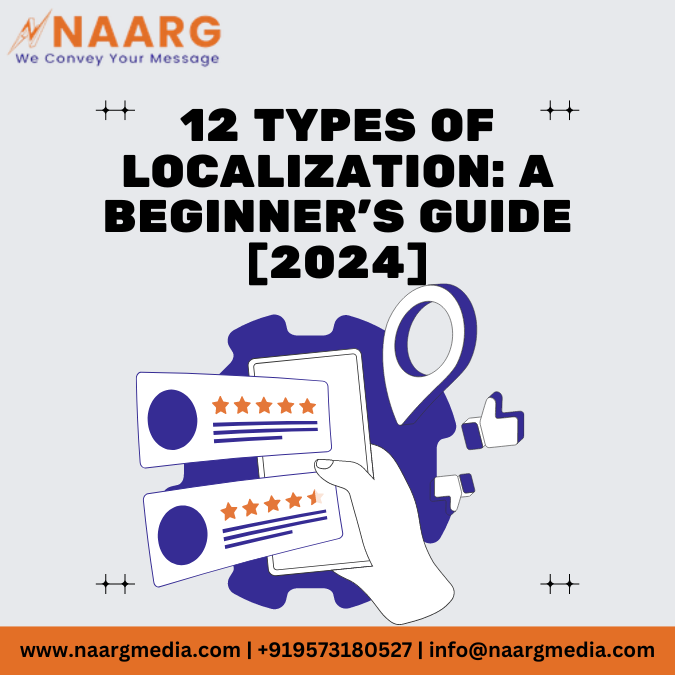Being a business owner in today’s globalized world is not easy. There is this constant pressure to go global and expand your business globally. And above all that, the concept of localization has emerged as a crucial component for success. From software to websites to making marketing materials and video games, the localization process plays a pivotal role in tailoring your content to resonate with your global audience.
But the question is: what exactly is localization, and why is it so important in today’s digital landscape? Localization is somewhat similar but different from translation. Localization is the process of adapting a particular piece of content to the language and cultural preferences of the target audience. So, with localization, your product gets a new version that is suitable for your target audience. And they will feel as if it was created for them only.
So if you are a beginner venturing into the fascinating field of localization and types of localization, then you are at the right place. We will be discussing the fundamentals of localization, its types, and the importance of localization in global markets.
So, let’s get started.

The Importance of Localization in Global Markets
Localization is crucial for your business if you are seeking success beyond your domestic borders. Effective localization will build trust with your local target audience by demonstrating respect and understanding for their unique preferences and norms. It will enhance your brand relevance, improve customer satisfaction, and ultimately drive sales and revenue, ensuring that the offerings you provide resonate with your target audience.
Also, according to CSA research, 76% of people prefer to buy products and services in their native language. Also in the same research, it was revealed that 40% of consumers won’t even buy from a website that is not in their native language. Okay, we understand you must be a little skeptical and must be wondering how localization will help you stand in global markets. Let’s help you understand with an example.
You must have heard about the streaming giant for music, Spotify. Spotify’s major success lies in its localization powers. It has curated its playlists based on regional music tastes. It is kind of a local DJ for every country it operates in. To conquer a global market you have to think like a global company but act like a local entrepreneur.
Moreover, once you localize your products and services, it can mitigate risks associated with cultural misunderstandings or inappropriate messaging that could harm your brand reputation. So, if you prioritize localization, you will gain a competitive edge by effectively navigating diverse global markets and establishing meaningful connections with your target audience.
12 Types of Localization
Now, when it comes to localization, you must have heard about different types of localization. Like website localization, software localization, and many more. These are some common types of localization that you must have heard about. Now let us take you to the many types of localization that are out there and can be beneficial for your business. So, listed below are the types of localization that can help your business reach the global market.
1. Website Localization
It is an unsaid rule that your website serves as your digital storefront, shaping your visitors’s perceptions of your products or services and, in general, your brand. And website localization is not merely about translating content into multiple languages but about crafting an experience that resonates with your diverse target audience. From the images you select to the navigation structure, every little detail influences how your target audience will engage with your brand.
2. Multimedia Localization
As we are all aware, multimedia has emerged as a powerful tool for engaging your target audiences. You can see that podcasts have experienced significant growth over the last decade. And video content remains the cornerstone of any business. But simply creating content is not enough in today’s time; you need to ensure that it resonates and can be accessed by your target audience to maximize the impact and achieve your target goals.
3. SEO Localization
SEO is the new superhero if you are into content creation. And so is SEO localization. SEO localization involves optimizing website content and digital assets to enhance the visibility of your brand in your target market. This involves tailoring keywords, meta tags, and other on-page elements to target local search queries. SEO localization strategy empowers your brand to attract more organic traffic, increase brand awareness, and ultimately drive conversions.
4. Software Localization
Coming to the most commonly discussed localization process, software localization. It is a process where developers adapt software applications to suit the cultural, linguistic, and functional requirements of their target market. The process generally involves translating user interfaces, menus, and documentation into the target language. With software localization, you can ensure that your products and services are accessible and user-friendly.
5. App Localization
The process of customizing mobile apps to meet the linguistic, cultural, and technological needs of your target market is known as app localization. Now, this app localization process encompasses translating your app’s interface, notifications, and other textual content into the target language spoken by your target audience. Localizing your app will enhance user engagement, broaden the customer base, and increase customer satisfaction. Ultimately driving app adoption and retention rates in global markets.
6. Content Localization
This type of localization involves adapting written, visual, and multimedia content to suit the linguistic, cultural, and contextual preferences of specific target audiences. Now this involves translating written content, like articles, blogs, and marketing materials, into the language spoken by your target audience. By localizing content, you can effectively communicate your message and connect with your target audience on a much deeper level.
7. Language Localization
With language localization, you can actively adapt your product or services and content to align with the linguistic preferences and cultural nuances of your specific target audience. This localization process involves translating text, audio, and visual elements into the target language spoken by your target audience. By engaging with language localization, you can actively reach and engage with your target audience. Hence, fostering stronger connections.
8. Social Media Localization
With social media localization, your business can actively tailor its social media content, campaigns, and strategies to resonate perfectly with its target audience. Social media localization includes creating posts, captions, and hashtags in the language spoken by your target audience. You can effectively connect with your target audience on a personal level and drive brand awareness and loyalty in diverse global markets.
9. Gaming Localization
This gaming localization process actively adapts video games to suit the cultural, linguistic, and regulatory requirements of your target market. This specific process involves translating in-game text, dialogue, menus, and instructions into the target language. Also, developers modify the content to align with the preferences of their target audience. With gaming localization, you can reach a broader audience, enhance engagement, and ultimately drive sales and success.
10. Product Information Localization
Many users from different geographic regions or diverse backgrounds may utilize your product in unique ways or for different purposes. They may also relate to instructions associated with your product. So it becomes essential to localize these descriptions. This is where product localization comes into play. This process specifically involves adapting product and product descriptions in the specific target language. By doing so, you can empower your target audience by showing them how your product can genuinely benefit them.
11. User Experience Localization
Whenever your target audience engages with your content, whether it is through an app or software, providing them with a localized user experience is essential for customer satisfaction. This is where user experience localization comes into play. That entails more than just translation. It requires the entire user experience to align with the preferences and needs of your target audience. This involves adapting currencies, dates, and times according to the target audience’s preferences for a seamless user experience.
12. Marketing Localization
It is very crucial to localize your marketing materials to resonate with your target audience. For this, you require marketing localization. Localized marketing content plays a pivotal role in shaping the perception of your target audience and the overall marketing experience. You can effectively connect with your target audience on a deeper level and foster stronger brand relationships.
Why is Naarg the go-to company for localization services?
Naarg Data Media Services is a translation and localization company and global language service provider that reaches a global audience in any language. We value customer satisfaction above all else. We can be your go-to translation and localization company because:
1. Extensive Experience
Naarg boasts a team of seasoned localization experts with years of experience in adapting content for diverse global markets.
2. Comprehensive Solutions
From language translation to cultural adaptation, we offer a wide range of localization services to suit the specific needs of every client.
3. Timely Delivery
We are committed to meeting deadlines and delivering results promptly, enabling our clients to launch their localized content on schedule.
4. Customer Satisfaction
Customer satisfaction is our top priority. We prioritize client satisfaction, providing ongoing support and feedback to ensure that the localization project meets expectations.
For more information on our services, reach out to us at info@naargmedia.com




